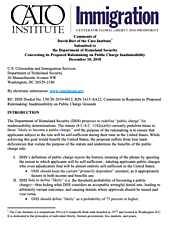- DHS’s definition of public charge rejects the historic meaning of the phrase by ignoring the extent to which applicants will be self-sufficient—labeling applicants public charges who even adjudicators find will be almost entirely self-sufficient in the United States.
- DHS should keep the current “primarily dependent” standard, as it appropriately factors in both income and benefits use.
- DHS should define “likely” as a probability of 75 percent or higher.
- DHS should use administrative or survey data to create a statistically valid factor model that predicts the probability of an immigrant becoming a public charge.
- DHS should estimate both the number of applicants whom the rule will deny or deter from applying and their fiscal net present value, using the National Academies of Sciences, Engineering, and Medicine’s 2016 report.
It is entirely feasible for DHS to make these improvements to the rule. DHS should amend the proposed rule to make these corrections and reissue it.


